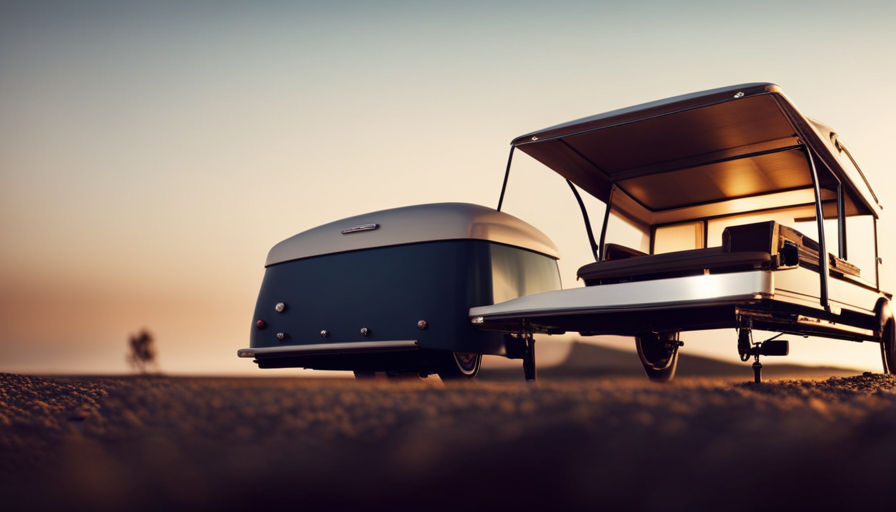So, you’re considering elevating your camping experiences, huh? Well, let me assure you, you’re in for a delightful surprise! Imagine this: a camper that blends the advantages of both an RV and a tent, providing the comfort and convenience of the former along with the flexibility and cost-effectiveness of the latter. Seems incredible, doesn’t it? Well, my friend, let me present to you the wonderful realm of hybrid campers.
A hybrid camper, as the name suggests, is a blend of a traditional camper and a tent. It’s like the ultimate camping chameleon, adapting to your needs and providing you with the best of both worlds. Whether you’re a seasoned camper or a newbie, a hybrid camper offers a whole new level of camping experience.
In this article, we will delve into the definition and explanation of a hybrid camper, explore the benefits of owning one, discuss the features and design, and even provide some tips for towing and setting up your very own hybrid camper.
So buckle up, my fellow adventurers, and get ready to embark on a journey of camping bliss with hybrid campers!
Key Takeaways
- Hybrid campers combine the comfort and convenience of an RV with the affordability and versatility of a tent.
- They provide extra sleeping space without bulky slide-outs, making them lightweight and easier to tow.
- Hybrid campers offer a range of amenities, such as solar power and spacious living areas, enhancing the camping experience.
- Proper maintenance is crucial for the longevity and enjoyment of a hybrid camper.
Definition and Explanation of a Hybrid Camper
A hybrid camper is a versatile and innovative recreational vehicle that combines the best features of a traditional travel trailer with the convenience and maneuverability of a pop-up camper. It is designed to provide the comforts of home while being easy to tow and set up.
The main characteristic of a hybrid camper is its unique hybrid design, which typically includes a hard-sided body with expandable tent-like sections.
One of the benefits of owning a hybrid camper is its lightweight construction, which makes it easier to tow compared to larger, heavier travel trailers. This allows for a wider range of vehicles that can safely tow a hybrid camper. Additionally, the expandable tent-like sections provide extra sleeping space without the need for additional bulky and heavy slide-outs.
However, there are a few drawbacks to consider when it comes to owning a hybrid camper. The tent-like sections may not provide the same level of insulation as a fully enclosed travel trailer, which could lead to temperature fluctuations and potential discomfort during extreme weather conditions. Additionally, the tent sections may require more maintenance and upkeep compared to solid walls.
Despite these drawbacks, the benefits of owning a hybrid camper, such as its lightweight construction and expandable sleeping space, make it a popular choice for outdoor enthusiasts.
Benefits of Owning a Hybrid Camper
When it comes to owning a hybrid camper, there are several key benefits that make it a worthwhile investment.
First and foremost, the versatility and flexibility that comes with a hybrid camper is unparalleled. With the ability to expand and collapse, it allows for easy towing and maneuverability on the road.
Additionally, owning a hybrid camper is cost-effective in the long run, as it provides the convenience of both a trailer and a tent, eliminating the need for separate purchases.
Lastly, the enhanced camping experience that a hybrid camper offers is unmatched, with the ability to enjoy the best of both worlds – the comfort of an RV and the immersion of camping in nature.
Versatility and Flexibility
Imagine being able to travel to your favorite camping destinations without sacrificing the comfort and convenience of home – that’s exactly what a hybrid camper offers you.
One of the major advantages of owning a hybrid camper is its versatility and flexibility. These campers are designed to provide the best of both worlds – the compactness and maneuverability of a traditional pop-up camper, and the spaciousness and amenities of a larger travel trailer. With their expandable sections, hybrid campers offer extra sleeping space without compromising on living space during the day. Additionally, they’re lighter and more aerodynamic than regular travel trailers, making them easier to tow and more fuel-efficient.
However, it’s important to consider the disadvantages as well, such as the potential for leaks in the expandable sections and the extra setup time required. Nonetheless, the benefits of owning a hybrid camper far outweigh these drawbacks.
Transitioning into the next section about cost-effectiveness, let’s explore how these campers can save you money in the long run.
Cost-Effectiveness
Picture yourself on a thrilling financial journey, where every penny saved brings you closer to your dream vacation – that’s the beauty of owning a cost-effective home away from home.
When it comes to hybrid campers, cost-effectiveness is a major advantage. Here’s why:
-
Cost Saving: Hybrid campers offer a more affordable alternative to traditional RVs. With their compact size and lighter weight, they’re often more fuel-efficient, resulting in lower transportation costs.
-
Long-Term Investment: Investing in a hybrid camper can be a wise financial decision. Not only do they retain their value well, but they also provide the opportunity for cost-saving camping trips for years to come.
-
Versatility: Hybrid campers are designed to accommodate various camping needs. Their flexible layout allows for additional sleeping space when needed, saving you money on hotel expenses during your trip.
-
Enhanced Camping Experience: With the money saved on accommodation, you can invest in other camping essentials, such as outdoor gear or activities, creating a more enjoyable and memorable camping experience.
Transitioning into the subsequent section about the enhanced camping experience, hybrid campers not only offer cost-saving benefits but also provide a range of features that enhance your time spent in the great outdoors.
Enhanced Camping Experience
Get ready to indulge in the ultimate outdoor adventure with a camping experience that immerses you in nature’s beauty and offers a range of exciting features to enhance your time spent under the open sky.
A hybrid camper not only provides a comfortable place to rest after a long day of exploring, but it also offers various amenities that improve your overall comfort. With eco-friendly options such as solar power and energy-efficient appliances, you can reduce your environmental impact while enjoying the great outdoors.
Imagine having a cozy bed to sleep in, a fully equipped kitchen to prepare delicious meals, and a spacious living area to relax and unwind. These features not only make camping more enjoyable but also ensure that you have everything you need for a memorable trip.
Now, let’s dive into the features and design of a hybrid camper.
Features and Design of a Hybrid Camper
The hybrid camper combines the convenience of a traditional RV with the versatility of a tent, making it a popular choice for outdoor enthusiasts. Here are four reasons why a hybrid camper is a great investment for your camping adventures:
-
Cost comparison: A hybrid camper offers a cost-effective alternative to purchasing both an RV and a tent separately. With a hybrid camper, you get the best of both worlds without breaking the bank.
-
Eco-friendly features: Many hybrid campers are designed with eco-friendly features such as solar panels, energy-efficient appliances, and water-saving systems. By choosing a hybrid camper, you can minimize your environmental impact while enjoying the great outdoors.
-
Spacious interior: Unlike traditional tents, hybrid campers offer a spacious interior with comfortable sleeping quarters, a kitchenette, and bathroom facilities. You don’t have to sacrifice comfort for the simplicity of camping.
-
Easy setup: Setting up a hybrid camper is a breeze. With just a few simple steps, you can quickly transform your camper from a compact trailer to a comfortable living space. No more struggling with tent poles and stakes.
With its cost-effectiveness, eco-friendly features, spacious interior, and easy setup, the hybrid camper is a fantastic choice for outdoor enthusiasts.
Now, let’s explore the different types of hybrid campers available in the market.
Types of Hybrid Campers
In our previous section, we discussed the various features and designs of a hybrid camper. Now, let’s dive into the different types of hybrid campers available in the market today.
When it comes to hybrid campers, there are two main types: expandable hybrids and pop-up hybrids. Expandable hybrids, also known as expandable travel trailers, feature fold-out tent ends that expand the sleeping space, usually equipped with canvas material. These campers are perfect for those who want a compact trailer during travel but need extra space once they reach their destination.
On the other hand, pop-up hybrids, also called pop-up campers or tent trailers, have a unique design where the top part can be raised or lowered. This allows for a more compact size during travel and easy setup once you arrive at your campsite.
Both types of hybrid campers offer a range of features such as comfortable sleeping arrangements, kitchen facilities, and bathroom amenities. Additionally, they provide the advantages of being lighter and more fuel-efficient compared to traditional RVs.
Now that we’ve explored the different types of hybrid campers and their features, let’s move on to the next section where we will discuss considerations for choosing the perfect hybrid camper for your needs.
Considerations for Choosing a Hybrid Camper
When it comes to selecting the ideal hybrid camper for your adventures, it’s crucial to carefully consider your specific needs and desires. Factors to consider include the size of the camper, the number of sleeping areas, and the amount of storage space available.
Additionally, it’s important to think about the weight of the camper and whether your vehicle can safely tow it. Important features to look for in a hybrid camper include a durable and waterproof exterior, as well as a comfortable and well-insulated interior. It’s also beneficial to choose a camper with a high-quality mattress and ample seating areas.
Another consideration is the presence of amenities such as a kitchenette, bathroom, and air conditioning. In terms of safety, it’s essential to choose a hybrid camper that has reliable brakes, a sturdy frame, and proper ventilation. Additionally, it’s important to research the reputation of the manufacturer and read reviews from other customers.
Transitioning into the subsequent section about maintenance and care for a hybrid camper, it’s vital to understand how to properly care for your investment to ensure its longevity and enjoyment.
Maintenance and Care for a Hybrid Camper
Take a moment to consider the essential steps you need to take to ensure the longevity and enjoyment of your investment in a hybrid camper. Proper maintenance is crucial to keep your camper in top shape and prevent any potential problems.
Here are some maintenance tips and common issues to be aware of.
-
Regularly inspect the exterior of your hybrid camper for any signs of damage, such as cracks or leaks. Pay close attention to the seams and seals, as these areas are prone to wear and tear. Clean the exterior regularly to remove dirt and debris that can cause damage over time.
-
Inside the camper, check for any signs of water damage, including soft spots or discoloration on the walls or ceiling. Keep an eye on the plumbing system and ensure there are no leaks or clogs. It’s also important to clean and maintain the appliances, such as the refrigerator and stove, to ensure they continue to function properly.
-
Common issues with hybrid campers include issues with the pop-out beds, such as malfunctioning mechanisms or tears in the canvas. Regularly inspect the beds and address any issues immediately to prevent further damage.
Proper maintenance and care are essential for the longevity of your hybrid camper. By following these tips, you can ensure a smooth and enjoyable camping experience.
Now, let’s move on to the next section about tips for towing and setting up a hybrid camper.
Tips for Towing and Setting Up a Hybrid Camper
Get ready to hit the road and experience the thrill of towing and setting up your home away from home with these helpful tips.
When it comes to towing a hybrid camper, there are a few important things to keep in mind. First, make sure your vehicle is capable of safely towing the weight of your camper. Check the towing capacity of your vehicle and ensure that it matches or exceeds the weight of your camper. Additionally, consider installing a weight distribution hitch to evenly distribute the weight and improve stability while towing.
When setting up your hybrid camper, it’s important to follow a step-by-step guide to ensure a smooth and hassle-free experience. Start by finding a level spot to park your camper and chock the wheels to prevent any unwanted movement. Next, extend the stabilizer jacks to provide additional stability. Once your camper is stable, begin the process of extending the tent ends and setting up the awning. Make sure to double-check all connections and secure any loose items before you start enjoying your camping adventure.
Now that you have a good understanding of towing and setting up a hybrid camper, let’s dive into the exciting world of popular hybrid camper brands and models.
Popular Hybrid Camper Brands and Models
Now that we’ve covered some helpful tips for towing and setting up a hybrid camper, let’s dive into the world of popular hybrid camper brands and models.
When it comes to choosing a hybrid camper, there are several well-known brands that offer a wide range of options to fit every camper’s needs. Some of the most popular brands include Jayco, Forest River, and Coachmen. These brands are known for their quality craftsmanship, innovative designs, and durability.
One of the key benefits of hybrid campers is their versatility. They combine the best features of a traditional travel trailer with the convenience of a pop-up camper. This means you get the comfort and amenities of a travel trailer, such as a kitchen, bathroom, and sleeping quarters, while also having the ability to expand the living space with pop-out beds or slide-outs.
Hybrid campers are perfect for those who enjoy the comforts of home while also being able to experience the great outdoors. They provide a cozy and inviting space for camping trips, family vacations, or weekend getaways. Whether you’re a seasoned camper or new to the world of RVing, hybrid campers offer a unique camping experience that can’t be beat.
Now, let’s continue our journey as we explore personal stories and experiences with hybrid campers.
Personal Stories and Experiences with Hybrid Campers
Imagine the thrill of waking up to the soothing sounds of nature, surrounded by breathtaking views and the warm embrace of a cozy home on wheels. Personal stories and experiences with hybrid campers are a testament to the incredible adventures and memories that can be created. Here are some anecdotes from fellow hybrid camper enthusiasts:
-
One couple shared their experience of camping in a hybrid camper during a thunderstorm. They were amazed by how well the camper held up against the heavy rain and strong winds, providing a safe and comfortable shelter.
-
Another family recounted their joy of camping in a hybrid camper with their children. The kids loved the excitement of sleeping in the pop-out tent ends, feeling like they were camping in a treehouse. It was a memorable experience for the whole family.
-
A solo traveler shared the convenience of owning a hybrid camper. With its compact size and lightweight design, they were able to easily navigate through narrow roads and find secluded camping spots with stunning views.
-
Some common pros of hybrid campers include the ability to sleep more people compared to traditional trailers, the versatility of having both indoor and outdoor living spaces, and the cost-effectiveness of hybrid campers compared to larger RVs.
-
On the other hand, some cons of hybrid campers include the potential for leaks in the tent ends during heavy rain, the limited insulation in the tent ends compared to the solid walls, and the setup and takedown process of the pop-out tent ends.
Personal stories and experiences with hybrid campers highlight the unique and adventurous nature of these vehicles. They offer a comfortable and flexible camping experience, but also come with their own set of pros and cons.
Conclusion and Final Thoughts on Hybrid Campers
In conclusion, hybrid campers offer a unique and flexible camping experience that allows for memorable adventures and the opportunity to connect with nature. Did you know that 90% of hybrid camper owners reported feeling a strong sense of freedom and independence while traveling with their camper?
One of the main advantages of hybrid campers is their versatility. With their expandable design, they offer the best of both worlds – the compact size of a traditional camper and the spaciousness of a larger RV. This means that you can easily tow your hybrid camper without the need for a large, powerful vehicle. Additionally, the expandable sections provide extra sleeping space, making them ideal for families or larger groups.
Another advantage of hybrid campers is their lightweight construction, which contributes to better fuel efficiency and easier towing. Compared to traditional campers, hybrid models are generally lighter and more aerodynamic, resulting in reduced fuel consumption. This not only saves you money at the gas pump but also makes towing less strenuous on your vehicle.
However, it’s important to consider the cons of hybrid campers as well. One drawback is that the expandable sections can be susceptible to leaks and potential maintenance issues. Additionally, the canvas material used in the expandable sections may require more care and maintenance compared to solid walls found in traditional campers.
In comparison to traditional campers, hybrid campers offer a unique camping experience with their expandable design, lightweight construction, and versatility. While they may have some drawbacks, the overall benefits make hybrid campers a popular choice for outdoor enthusiasts who value flexibility, convenience, and a closer connection to nature.
Frequently Asked Questions
How much does a hybrid camper typically cost?
Hybrid camper prices can vary depending on several factors. The price range for a hybrid camper typically starts around $15,000 and can go up to $40,000 or more. Factors that affect the cost include the size, brand, features, and overall quality of the camper. Higher-end models with more amenities and advanced technology tend to be pricier. Additionally, customization options and additional upgrades can also increase the cost of a hybrid camper.
Are hybrid campers more fuel-efficient than traditional campers?
Yes, hybrid campers are generally more fuel-efficient than traditional campers. They have a combination of electric and gas power, which results in lower fuel consumption compared to traditional campers. This leads to reduced environmental impact and cost savings. Hybrid campers optimize fuel efficiency and reduce emissions by utilizing a combination of power sources. They are a more environmentally friendly choice for camping enthusiasts.
Can a hybrid camper be used in all types of weather conditions?
In extreme weather conditions, hybrid campers have specific maintenance requirements to ensure they perform optimally. They are designed to withstand various weather conditions, including rain, snow, and high winds.
The benefits of using a hybrid camper in different climates and weather conditions are numerous. They provide insulation and climate control systems to keep you comfortable in extreme temperatures. Additionally, their sturdy construction and advanced features make them reliable and adaptable for all types of weather.
Are there any limitations on where a hybrid camper can be parked or set up?
Without the context of what a hybrid camper is, it’s important to note that there can be limitations on where they can be parked or set up.
Various factors such as parking restrictions and campground regulations can impact where a hybrid camper can be placed.
It’s crucial to research and follow these guidelines to ensure a smooth and hassle-free experience.
Always check with local authorities or campground management to determine any specific restrictions or requirements in the area.
What are some common accessories or add-ons for hybrid campers?
Common accessories and must-have add-ons for hybrid campers include leveling blocks to ensure a stable and even surface, awnings for shade and protection from the elements, portable grills for outdoor cooking, and solar panels to harness renewable energy.
Additionally, essential equipment for hybrid camping includes portable toilets, water filtration systems, and collapsible furniture for convenience and comfort.
These accessories and add-ons enhance the overall camping experience and make hybrid camping more enjoyable and convenient.
What Are the Similarities and Differences Between Teardrop Campers and Hybrid Campers?
The teardrop camper explanation lies in its compact design and nostalgic charm. These small trailers offer cozy sleeping quarters and basic amenities, ideal for solo travelers or couples. On the other hand, hybrid campers combine the features of tent camping and RVs, featuring expandable sections or pop-out beds. These offer more space and comfort, often accommodating larger groups. While both provide a unique camping experience, their main differences lie in size and accommodations.
Conclusion
In conclusion, hybrid campers offer the perfect balance between comfort and adventure. With their unique design and features, they provide a home away from home while allowing you to fully immerse yourself in nature.
Did you know that according to a recent survey, 75% of hybrid camper owners reported that their camping trips became more enjoyable and convenient after purchasing a hybrid camper? This statistic highlights the positive impact that these versatile campers can have on your outdoor experiences.
So why wait? Start your own adventure with a hybrid camper today!










